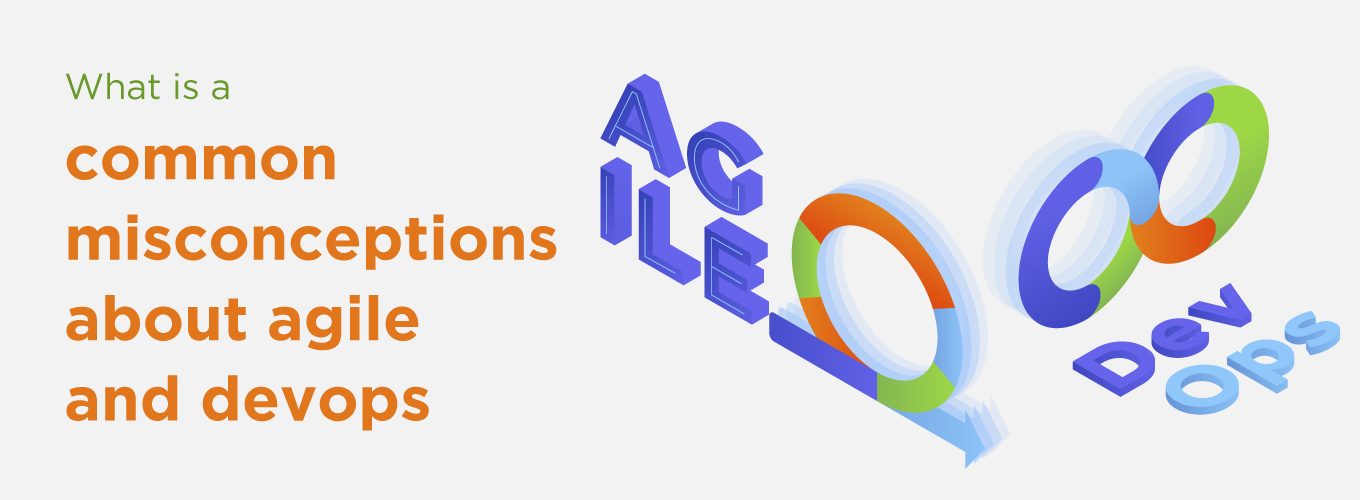What is a common misconceptions about agile and devops?
Both Agile and DevOps are widely popular methodologies and are frequently misunderstood. Both these are designed to help you achieve faster and more streamlined releases and better collaboration between teams. Some people believe these two words are synonyms and some believe that they are competing philosophies. However, comparing DevOps to Agile is like comparing apples and oranges because they are completely different concepts. Comparing them is inaccurate and unnecessary.
Table of Contents
Key Differences between Agile and DevOps
In Agile, an iterative approach is adopted towards project management and software development. It enables teams to provide value to their clients more quickly and with fewer challenges. The work produced by an Agile team is divided into a list of smaller and achievable targets that result in the smoother flow of the assigned work and hence is more manageable.
On the other hand, when DevOps is incorporated to unify the processes, they could automate for better performance and outcome. DevOps is the combination of equipment and strategies that will optimally equip the organization to provide service and delivery.
Agile software development is popular and has good success rates and so organizations are adopting it to improve their business operations. It enables organizations to streamline their teams and ensure that their employees work as per the requirement.
DevOps is a combination of two words: development and operations. Almost all organizations aim to achieve a business model where there is a right mixture of operations undertaken by the entity and the organization’s overall development.
Although many people believe that Agile and DevOps are the same thing, in reality there is a vast difference between the meaning and implications of these methodologies. Although they have different meanings, Agile and DevOps cannot exist in isolation. They need mutual support and collaboration to deliver the desired result in the organization.
Top 3 Misconceptions about Agile and DevOps
Misconception 1
The single biggest misconception about Agile and DevOps is that they are synonyms and they can be used interchangeably. Both have the same fundamental aim: To make the business operation smoother and get better results.
Agile is an operational methodology that divides complex tasks into doable, smaller proportions and assigns these tasks to different employees. The business then asks the employees to perform these tasks in a specified time frame. This will enable the business to supervise the business process and rectify trouble areas in time.
On the other hand, DevOps is an ideology that maintains the importance of teamwork and transparent communication between the different teams of the company.
Misconception 2
There is a common misconception that simply by purchasing both technologies, an organization’s business operations would significantly improve. While a company can undoubtedly achieve the Agile framework by purchasing the tools, it can reap the full benefit only when it undergoes structural change in its policies related to employee training, product designing and transparent communication.
Similarly with DevOps, the employees should be aware of the importance of teamwork and collaboration. Companies must work towards developing better practices that would help in the implementation of these technologies.
Misconception 3
The third misconception is that businesses can implement DevOps technology as a replacement for Agile methodology. Both methodologies have similar goals: to provide quality value addition to the existing business operations of the organization. Only the application of these technologies is different from each other. They cannot be successful if used in isolation. Companies must integrate Agile and DevOps together to achieve their desired goal. They are codependent on each other.
Conclusion
Market competition is increasing daily and companies are adopting these technologies to stay ahead of their competitors. Organizations must understand that although Agile and DevOps are essential for better development and performance of the software, they are based on different ideologies and follow different methodologies. There are many misconceptions about these technologies due to which businesses may not achieve the maximum benefits of these methodologies. Therefore, companies must do adequate research before implementing Agile and DevOps.
People also ask
- What are some common Agile frameworks?
Scrum: a widely used framework that emphasizes iterative development, with short time-boxed iterations and sprints, a dedicated role of Scrum Master to facilitate the process, and regular ceremonies like daily stand-ups, sprint planning, sprint review, and sprint retrospective.
Kanban: a visual workflow management framework that focuses on continuous flow of work and limiting work in progress (WIP).
Lean: a philosophy and set of principles for creating more value with fewer resources.
Extreme Programming (XP): a software development framework that emphasizes practices like continuous integration, test-driven development (TDD), and pair programming.
- What are some common DevOps practices?
Some common DevOps practices include continuous integration (CI), continuous delivery (CD), infrastructure as code (IaC), automated testing, automated deployment, monitoring and logging, configuration management, and collaboration and communication tools.
- How do Agile and DevOps work together?
Agile and DevOps are complementary approaches that can work together to enable faster, more flexible, and higher quality software development and delivery. Agile and DevOps help organizations achieve faster time-to-market, improved quality, and enhanced customer satisfaction.
- What are some benefits of implementing Agile and DevOps?
- Faster time-to-market
- Improved software quality
- Increased customer satisfaction
- Higher team collaboration and morale
- Reduced risk of costly defects
- Increased flexibility and adaptability to changing requirements
- Enhanced transparency and visibility into the development process
- Improved business agility and competitiveness.










